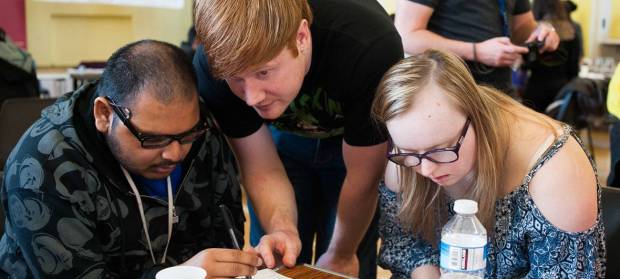Who to turn to
The Learning Disability Helpline (England) is a very busy service, and we help as many people as we can. However, we are not a crisis service, and due to the volume and type of enquiries we receive, we cannot always respond to urgent issues outside our opening hours, 10am - 3pm Monday to Friday.
If you need emergency assistance, please refer to the instructions on this page for guidance.
If you contact us by email we will respond when we are next open.
Email the HelplineWhere there is an immediate risk of harm
If you are thinking of hurting yourself, or you believe that someone is about to harm themselves or somebody else – call the emergency services on 999 or 112.
We have put together this list of agencies, services, and key information, to help you manage in a crisis.
If you or someone else is in crisis, but you don’t think you need the police or an ambulance
Contact a G.P. (doctor) – Search for a GP
Contact an out of hours service, by calling 111 or using this link
Take them to the local urgent care centre/hub. You can search for the nearest one here
Get urgent mental health help by using this link
You can speak to the Samaritans, (samaritans.org) they are available 24 hours a day for confidential, non-judgmental support:
Call them on 116 123 or email: jo@samaritans.org
Suicide Prevention Charity – Papyrus, run a crisis helpline called Hopeline for children and young people under the age of 35. They can be contacted:
By telephone on 0800 068 4141
By text on 07860039967
By emailing pat@papyrus-uk.org
You could also contact SHOUT:
By texting SHOUT to 85258
Or find out more about SHOUT at https://giveusashout.org/get-help/
Hub of Hope have a searchable database, just put your postcode in and you can find crisis support local to your area https://hubofhope.co.uk/
If you are a child, you can contact Childline – by calling 0800 11 11 or by visiting the Childline website
If you an adult and concerned about a child, contact NSPCC helpline for adults – 0808 800 5000.
If your loved one has been taken into hospital – there is more information on Mencaps Health pages.
If you are concerned about someone being admitted to an
Assessment
 An assessment is a way of finding out what help a person needs. When you have an assessment, you might have to go to a meeting or fill in a form.
and Treatment Unit (A.T.U.) – there is more information here.
An assessment is a way of finding out what help a person needs. When you have an assessment, you might have to go to a meeting or fill in a form.
and Treatment Unit (A.T.U.) – there is more information here.
Help with food
If you need food, click here for the Trussell Trust and help finding a local foodbank.
Help with the cost of living
If you need advice and support due to the current cost of living crisis, we have information and
easy read
 Easy Read is a way of making written information easier to understand. Pictures are usually added next to the writing.
guides on the Mencap cost of living pages.
Easy Read is a way of making written information easier to understand. Pictures are usually added next to the writing.
guides on the Mencap cost of living pages.
Help with money
If you need help with money or benefits the following organisations can support you:
Turn2us – www.turn2us.org.uk
Money Advice Service -www.moneyadviceservice.org.uk
Citizens Advice Bureau – www.citizensadvice.org.uk
Help with housing
If you are going to be made homeless, contact Shelter by calling 0808 800 44 44, or clicking here and using their online Webchat. You also need to contact the housing department at your local council without delay.
Other support
The Salvation Army can also offer support in crisis situations – you can find out more information here
What is safeguarding?
Safeguarding is what we do to keep people safe from abuse, bad treatment, neglect or exploitation. Most of the time when people talk about safeguarding, they are talking about protecting children or vulnerable adults.
If you are concerned that a vulnerable adult or a child is at risk of exploitation, harm, abuse or neglect and they are in immediate danger, contact the police on 999 or 112.
To find out more about Safeguarding adults and what to do if you are worried someone is being treated badly, please click here
